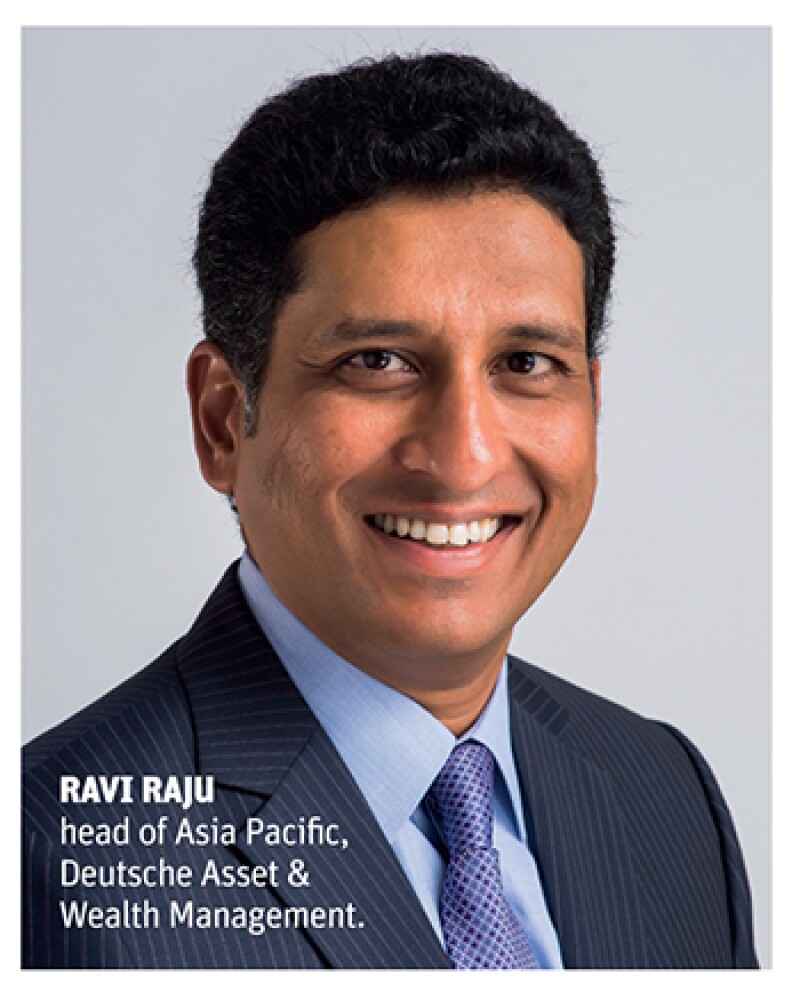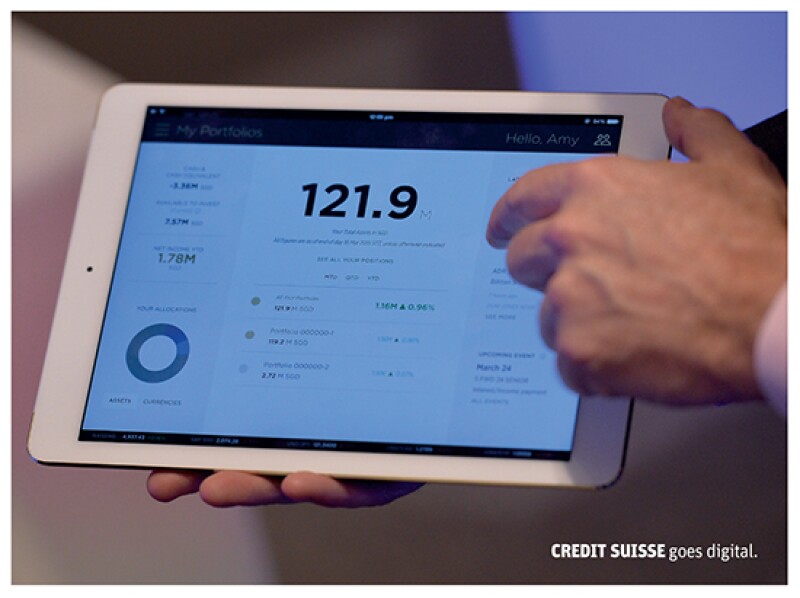With its growing wealth and young population, Asia seems ripe for robo-advisers, the automated investment services that have already disrupted the wealth management industry in the US.
According to a recent CapGemini RBC Wealth Management Asia Pacific report, 82% of high net worth individuals in Asia expect the bulk of their wealth management services to be conducted entirely or mostly through digital channels over the next five years, compared with 61% in the rest of the world.

The survey found that Asia was where the highest percentage of high net worth individuals believed that digital contact with wealth managers was more important than direct contact, with 37.8% compared to the 25.7% global average.
Yet despite the interest, private banks have lagged behind in the technology department.
“Private banking is pretty slow to technology — they’re not the fastest movers," says Justin Ong, Asia Pacific asset management leader at PricewaterhouseCoopers LLP in Singapore. "It’s left a space that’s being filled by robo-advisers."
Enter the newcomers
Asia doesn’t yet have the likes of Wealthfront or Betterment.com — two big US automated investment services — but smaller companies are stepping in and eyeing the market. Mathias Helleu, executive chairman of online brokerage 8 Securities, saw an opportunity to bring robo-advisers to Asia because customers in the region have fewer choices.
“Here it’s a wider market because no matter how old you are, you are left with few choices," he says. "You can put money in a savings account, have access to a fund supermarket that charge fees on top of mutual fund fees or pay an adviser."
8 Securities has recently launched a robo-investing service called 8 Now! in Hong Kong. The service allows customers to invest $1,000 chunks into one of six portfolios designed by Morningstar. Customers fill out a questionnaire of eight questions and can check their portfolio on a computer or smartphone. 8 Now! charges a flat rate of 0.88%. The service will be launched in Japan soon.
“Today, 70% of transactions done by retail are done through online brokerages," says Helleu, who is the former managing director of the international business of E*Trade, a US-based financial services company. "I think over time the same thing will happen with wealth management. Technology needs to disrupt the industry to put pressure on the fees.
“For most customers, the fees charged don’t match the service. What does it mean to have face to face time when your branch manager rotates every six months and you are cross-sold an insurance product or this or that? I think more and more people don’t want to waste their time. There is a lack of innovation because of the lack of competition."
Another newcomer is Hedgeable, a New York-based robo-adviser that is expanding internationally. The company is opening in the UK and Australia and is eyeing China, Hong Kong, Singapore and other Asian countries next. Chief executive Mike Kane says the company is currently testing the service with a few customers in Hong Kong.
Kane started Hedgeable in early 2009 with his twin brother. The two previously worked at firms such as Bridgewater Associates and Sailfield Capital Partners. 2009 was deep in the period of the financial crisis. They noticed that while the average investor lost about 40% of their net worth, the ultra-wealthy lost less than half of that.
“The main goal of Hedgeable is to bring a more sophisticated product to the mass market…to bring a high net worth product with more value than the traditional robo-adviser,” he says.
“We’ve seen a split in the market. You have private banking [where] it’s still a very personal relationship and I don’t know if they will ever feel comfortable doing things online. But we’re seeing a rift with millennials inheriting money. They do everything online and don’t have private banking money yet."
Kane sees particularly strong demand for a product such as Hedgeable in emerging markets because clients “have nowhere to go”. He saw, for instance, that about a quarter of Hedgeable’s customers were coming from overseas. Customers just wanted access to US markets but didn’t have many good local solutions, he says. And they wanted something safe and expertly managed.
To stand apart from large robo-advisers such as Wealthfront, FutureAdvisor or Betterment.com, Hedgeable aims to have more robust and customised offerings. Eventually, Kane envisions more localised versions of Hedgeable for various markets.
For now, though, the focus is primarily on US markets. The company charges a flat fee that ranges from 0.3% to 0.75%, with overseas customers paying the top of that range to reflect the extra complexity.
Target customers
For now, robo-advisers in the US and Asia are mostly targeting younger users in the mass-affluent space. This is a group that might not have quite enough to merit the services of a private banker but may well amass a fortune in a decade or so.
Most private banking clients tend to be in their late 50s and 60s and there is an older generation of bankers serving older clients, says Kane, which helps to explain why private banks haven’t yet embraced the latest technology.
But this client profile is changing, and the pace of that change will quicken, especially in Asia. This goes beyond simply the generational transfer of wealth among the very rich, but also includes new middle class customers from China and India who are more tech savvy.
There are some intra-regional variations. Japanese investors are the least interested in digital services, according to the CapGemini RBC survey, with only 25.7% of Japanese high net worth individuals demanding digital interaction, compared to 61.5% elsewhere in Asia. In emerging markets such as Indonesia and India, demand for mobile applications is particularly high.
Demand for digital channels is strong across all age groups in Asia. And high net worth individuals not only want to check their portfolios online and on mobile devices but also to interact with wealth managers through social media and video, the report found.
Chinese customers in particular like the new breed of online financial services. Alibaba’s online payment service, Alipay, has been very popular and its online money market fund, Yu’e Bao, quickly became China’s largest money market fund — and the fastest-growing fund ever.
It's not all plain sailing, however, and robo-advisers face some unique challenges in Asia. For one thing, customers there are less accustomed to paying fees for advice. Private bankers have been traditionally been treated much like brokers, helping to explain why private banks in Asia have lower profit margins than elsewhere.
Investors in the region “tend to have a trading mentality and are used to commissions and rebates, so the concept of fees is still relatively new," says Ong at PwC. "Clients don’t want to pay for advice."
Robo-advisers might be cheaper, but they do still charge a fee and can expect to meet with some resistance on this front.
Part of the reluctance is down to the fact that Asia’s wealthy tend to be entrepreneurs and are more accustomed to managing their own wealth. But it is starting to shift, says Ong. Regulators want to move away from the fee rebate and commission structure and are also trying to stamp out product churn. The result should be more fee-based platforms.
Keeping calm
Private banks have certainly taken notice of the rising interest in robo-advisers. But they typically say they don’t pose a threat because electronic advisers can’t handle many of the needs of private banking clients.
“They do not currently present a realistic challenge in Asia to the ultra high net worth or high net worth client,” says Ravi Raju, head of Asia Pacific for Deutsche Asset & Wealth Management. Good relationships between wealth managers and clients depend on a "human touch" and a more detailed explanation and ongoing support than robo-advisers can provide, he argues.
That said, private banks do need to look out. “The limitations of analytics and robo-advisers are not structural but temporary,” he adds.

Client financial demands are complex, says Francois Monnet, chief operating officer of Private Banking Asia at Credit Suisse, noting that clients will look at wealth planning across generations that require solutions from both private banking and investment banking to cover corporate and personal wealth management.
“We believe a core part of our value proposition to our clients is that we understand them as individuals — we have relationships built on shared experiences and trust," he says. "While digital can enhance this relationship, it will not replace it anytime soon."
Private bankers also note that robo-advisers have limited capabilities because they rely on algorithms to create ETF-based portfolios. This is efficient but cannot accommodate more complex investment needs. Also, robo-advisers have a local offering, whereas private banking clients typically have global investing needs.
Hedgeable’s Kane said he is working on providing unique offerings such as original research, evaluations of private companies, as well as Bitcoin and private equity investing.
Meanwhile, private banks are also stepping up their digital game. Credit Suisse in March launched its digital private banking platform to clients in Asia. The new platform, which includes a smartphone app, lets clients check account information and read market insights, as well as trade equities ETFs, REITs and spot foreign exchange.
Monnet says Credit Suisse launched the services in response to demand from clients that are becoming more digitally savvy.
Friend or foe?
Hedgeable and 8 Securities say they are not looking to disrupt the private banking industry but rather partner with it. With that in mind Hedgeable’s Kane has been talking to banks about teaming up. "There are lots of uses for our platform," he says. “We will partner with as many as possible.”
Kane reckons every bank and investment firm will have a digital solution in the next year. “They’re deathly afraid of losing younger customers who have a few million but don’t want to go through Goldman Sachs or Morgan Stanley.”
Deutsche’s Raju believes robo-advisers highlight rapid changes in how clients engage with those who manage their money, and are putting pressure on bigger players to up the ante on the digital front.
Online sales channels are still developing also and may well start offering advisory services. Fundsupermart.com in Singapore, the online unit trust distribution arm of iFast Financial, has started featuring sample portfolios that take into account risk tolerance, asset allocation and investment objectives.

